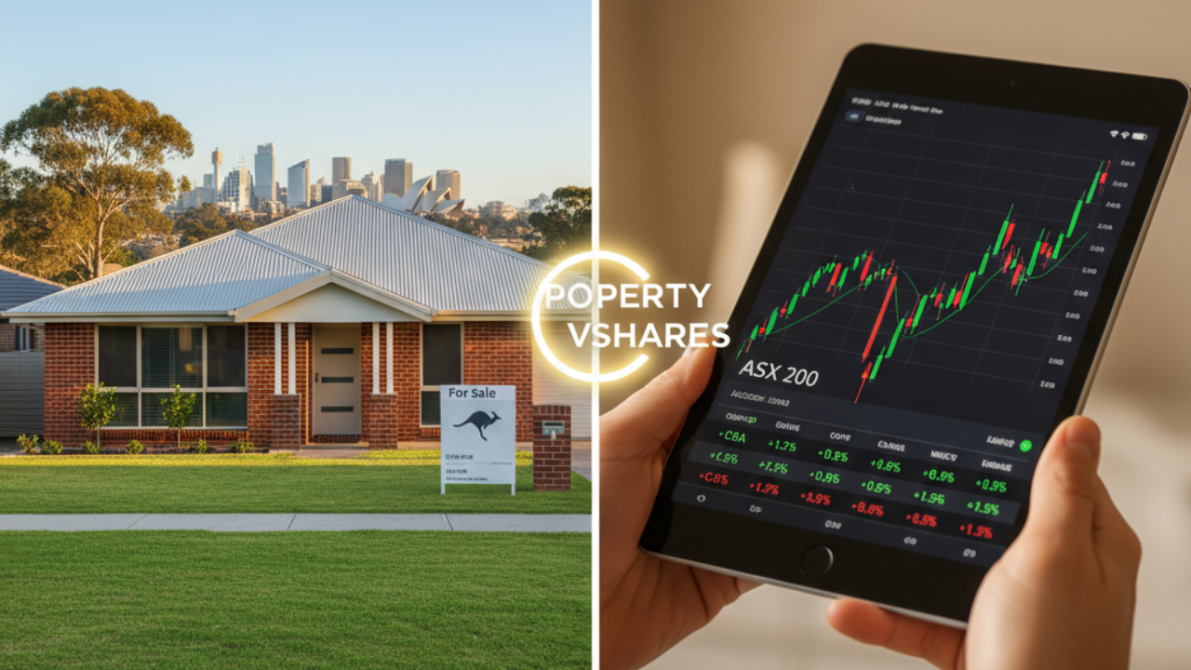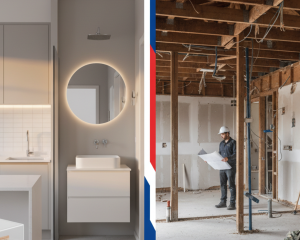Property vs Shares: Which Is Better for Long-Term Wealth?
Key Takeaways
- Both property and shares offer strong long-term wealth building potential, each with unique risk and reward profiles
- Property investment provides leverage opportunities and tangible assets, while shares offer liquidity, diversification, and ease of entry
- Australian property has historically doubled in value every 7–15 years in major cities, while shares have delivered 9–10% annual returns
- The most effective wealth strategy often combines both asset classes for balanced, long-term growth and risk management
Every Australian investor faces a crucial decision: is it better to invest in property or shares for long-term wealth? If you have ever wondered whether your hard-earned money is best placed in real estate or the stock market, you are not alone. The pressure to secure your financial future and avoid costly mistakes can be overwhelming.
This classic investment debate has sparked countless discussions around dinner tables, in financial planning offices, and across online forums. With property prices reaching new highs and share markets delivering impressive returns, the stakes for building long-term wealth have never been greater. Making the wrong choice could mean missing out on decades of wealth creation or, worse, seeing your nest egg shrink when you need it most.
The truth is, both property and shares have proven themselves as powerful vehicles for long-term wealth building. According to insights from PropertyChat.ai, Australia’s leading property investment education platform, the key is not choosing one over the other, but understanding how each fits into your unique financial strategy. Let’s explore the strengths and challenges of each asset class to help you make an informed decision.
The Australian Property Investment Landscape
Property investment has long been the cornerstone of wealth creation in Australia. The tangible nature of bricks and mortar appeals to investors who want to see and touch their assets. Beyond emotional comfort, property offers unique advantages that have made it a favourite among wealth builders.
The Power of Leverage in Property Investment
One of the most compelling advantages of property is leverage. With a 20% deposit, you can control a $500,000 asset with just $100,000 of your own money. If that property increases in value by 10%, your equity grows by $50,000—a 50% return on your initial investment.
This leverage effect, known as gearing, allows property investors to amplify their returns. Unlike shares, where margin lending carries substantial risks and margin call requirements, property loans are secured against the asset itself. Banks do not demand immediate repayment if property values temporarily dip, provided you can service the loan.
Historical Performance: How Fast Do Property Prices Double?
Recent data shows that property growth varies across Australian capital cities. Sydney has been a standout, with house prices doubling roughly every 10 years. Brisbane, Adelaide, and Hobart have also shown strong growth, with values increasing by 80–90% over the past decade.
However, not all markets perform equally. Perth and Darwin have experienced much slower growth, with some properties taking two decades or more to double in value. This highlights the importance of location and timing in property investment success.
The Reality of Rental Income
While property can generate rental income, net returns after expenses are often lower than many investors expect. Gross rental yields nationwide average around 4.4%, but after accounting for interest payments, maintenance, insurance, council rates, and property management fees, the net yield can be significantly reduced—sometimes even negative in highly leveraged situations.
The Share Market Alternative
Share market investing offers a different pathway to long-term wealth, with its own set of advantages and challenges. The Australian share market (ASX 200) has historically delivered strong returns, averaging 9–10% per annum over the long term when dividends are included.
Liquidity and Diversification Benefits
Shares provide unmatched liquidity compared to property. You can buy or sell shares within minutes, allowing for quick portfolio adjustments and access to capital when needed. This flexibility is particularly valuable during market volatility or when personal circumstances change.
Diversification is another significant advantage. Even with a modest investment, you can spread risk across multiple companies, industries, and even countries through index funds and ETFs. This contrasts with property, where a single investment property concentrates risk in one asset and location.
Dividend Income and Franking Credits
Australian shares offer attractive dividend yields, currently around 3.5% for the ASX 200. The franking credit system provides additional tax benefits, effectively reducing the tax burden on dividend income for Australian investors. This makes shares particularly tax-efficient compared to many other investment options.
Volatility: The Double-Edged Sword
Share market volatility can be both a challenge and an opportunity. While daily price fluctuations can be emotionally taxing, they also create opportunities for disciplined investors. The key is maintaining a long-term perspective and avoiding the temptation to buy high and sell low during market cycles.
Comparing Long-Term Wealth Building Potential
When examining long-term wealth creation, both asset classes have delivered impressive results, but through different mechanisms.
Capital Growth Comparison
Over the past 20 years, Australian property has generally matched or exceeded share market returns in many locations. Houses in major cities have typically outperformed units, with the land component driving much of the appreciation. However, share market returns have been more consistent across different time periods and do not depend on specific geographic locations.
Total Return Analysis
While property may show strong capital growth, shares often provide superior total returns when dividends are reinvested. The compounding effect of dividend reinvestment can be particularly powerful over decades of investing.
Risk-Adjusted Returns
Property’s perceived stability comes partly from infrequent valuations rather than true price stability. Shares show their volatility daily, while property values move more slowly but can still experience significant corrections during economic downturns.
The Tax Implications
Understanding the tax treatment of each investment is crucial for maximising long-term wealth.
Property Tax Benefits
Investment property offers several tax advantages:
- Negative gearing allows rental losses to offset other income
- Depreciation deductions on building and fixtures
- Capital gains tax discount of 50% for assets held over 12 months
- Principal residence exemption from capital gains tax
Share Investment Tax Efficiency
Shares provide their own tax benefits:
- Franking credits reduce tax on dividend income
- Capital gains tax discount for assets held over 12 months
- Lower transaction costs compared to property
- No ongoing maintenance or management expenses
Building a Balanced Wealth Strategy
The most successful long-term investors often do not choose between property and shares—they use both strategically. This approach, supported by insights from PropertyChat.ai’s comprehensive investment education, recognises that diversification across asset classes can reduce risk while maintaining growth potential.
The Hybrid Approach
Consider starting with shares for their accessibility and liquidity, then adding property as your wealth and borrowing capacity grow. This progression allows you to benefit from both asset classes while managing risk appropriately.
Lifecycle Considerations
Your investment strategy should evolve with your life stage:
- Early career: Focus on shares for flexibility and lower entry costs
- Peak earning years: Add property for leverage and tax benefits
- Pre-retirement: Maintain diversification while reducing risk
- Retirement: Emphasise income-producing assets
Making Your Decision
The choice between property and shares is not binary—it is about finding the right mix for your circumstances. Consider these factors:
Your Risk Tolerance
Property’s slower-moving nature may suit conservative investors, while shares require comfort with daily volatility. However, both carry long-term risks that must be understood and managed.
Available Capital
Property requires substantial upfront capital for deposits, stamp duty, and transaction costs. Shares allow you to start with smaller amounts and build gradually.
Time and Involvement
Property investment requires active management, even with professional property managers. Shares, particularly through index funds, can be truly passive investments.
Geographic Preferences
Property ties you to specific locations, while shares allow global diversification. Consider whether you want exposure to international markets or prefer to keep investments local.
The Path Forward
Both property and shares have created substantial wealth for Australian investors over the long term. The key is understanding how each fits into your overall financial strategy and risk profile.
PropertyChat.ai emphasises that successful investing is not about finding the “perfect” asset class—it is about building a diversified portfolio that aligns with your goals, timeline, and risk tolerance. Whether you choose property, shares, or a combination of both, the most important step is to start investing consistently and maintain a long-term perspective.
Remember, the best investment strategy is one you can stick with through market cycles. Consider seeking professional advice to develop a personalised approach that maximises your wealth-building potential while managing risk appropriately.
Your journey to long-term wealth does not have to be an either-or decision. By understanding the strengths and limitations of both property and shares, you can build a robust investment strategy that serves your family’s financial future for decades to come.
Conclusion & Call to Action
Choosing between property and shares for long-term wealth building is a personal decision that depends on your goals, risk tolerance, and resources. The most successful investors often combine both asset classes to create a balanced, resilient portfolio. If you are ready to take the next step in your wealth-building journey, explore the comprehensive resources and expert guidance available at PropertyChat.ai to develop a strategy tailored to your unique situation.
Related Articles You May Find Useful
Shares vs ETFs: What’s Right for Your Portfolio?
How to Start Investing in Property: A Beginner’s Guide
Understanding Leverage in Property Investment
The Pros and Cons of Negative Gearing
Do you have other questions?
Transcript
Property vs Shares: The Wealth Secret Nobody Tells You
0:00All right, let’s talk about one of the
0:01biggest questions you’ll ever face when
0:03it comes to building wealth in
0:04Australia. Should your money go into
0:06property or should it go into the share
0:08market? It’s the ultimate debate. And
0:10today, we’re going to break it all down.
0:12I mean, this isn’t a small decision,
0:15right? The path you choose here, it can
0:17literally define your financial life for
0:19years, even decades to come. So, yeah,
0:22getting it right is a pretty big deal.
0:25And look, you are definitely not the
0:27only one wrestling with this. This is
0:29the great Australian debate. You hear it
0:31at barbecues. You see it online. And
0:34with property prices where they are and
0:35the share market doing what it’s doing,
0:37the stakes feel higher than ever. Okay.
0:40So, here’s how we’re going to tackle
0:42this beast. First, we’ll dive into the
0:44case for property. Then, we’ll flip the
0:47coin and look at the case for shares.
0:49After that, we’ll put them in the ring
0:50for a head-to-head showdown. And
0:52finally, we’ll talk about building a
0:54strategy that actually works. Okay,
0:57first up, let’s talk about the great
0:59Aussie obsession, property. For
1:01generations, it’s been the go-to for
1:03wealth creation in this country and for
1:05some very, very good reasons. You know,
1:08there’s just something about property,
1:10isn’t there? It’s tangible. You can see
1:12it, you can touch it, you can stand in
1:14front of it. But it’s not just about
1:16that feeling of security. The real
1:18magic, the secret sauce lies in one key
1:21advantage, leverage. So, what on earth
1:25is leverage? You’ll hear it called
1:27gearing a lot here in Australia. All it
1:29really means is using someone else’s
1:31money, usually the banks, to control a
1:33much, much bigger asset. So, with a 20%
1:35deposit, you get to control 100% of a
1:38property that’s worth five times your
1:39investment. And this is where things get
1:42really exciting. Let’s say you put a 100
1:45grand down on a half a million property.
1:47If that property’s value goes up by just
1:4910%, that’s a $50,000 gain. But on your
1:52original 100 grand, that is a huge 50%
1:55return. That’s the power of leverage in
1:58action. And if you look back, this
2:00strategy has been a massive winner for a
2:02lot of people, the long-term trend in
2:04Australia’s big cities has been pretty
2:05consistent. Property values have tended
2:07to double roughly every 7 to 15 years.
2:10But, and this is a massive but,
2:13location, location, location. It is
2:16everything. Just look at the difference
2:18here. Over the last decade, Sydney’s
2:20roughly doubled and Brisbane’s seen some
2:22incredible growth, but Perth, a totally
2:25different story. Not all markets are
2:27created equal. Not by a long shot. And
2:30here’s another little dose of reality.
2:33You might see a property advertised with
2:34a great rental yield, but remember,
2:37you’ve got to subtract all the costs.
2:39We’re talking mortgage interest, council
2:41rates, insurance, repairs. By the time
2:44you’re done, the actual cash in your
2:45pocket can be a lot less than you think.
2:47The bottom line here, you’ve got to run
2:49the numbers always.
2:52Okay, so that’s property. Now, let’s
2:54swing over to the other corner of the
2:55ring and talk about shares. It’s a
2:58totally different beast, but it offers
2:59its own incredibly powerful path to
3:01building long-term wealth. And when you
3:04look at the numbers, shares have a
3:05pretty impressive track record, too.
3:07Over the long haul, the ASX 200, that’s
3:10the top 200 companies in Australia, has
3:12delivered average annual returns of
3:14around 9 to 10%. And that number, by the
3:16way, includes both the growth in the
3:18share price and the dividends you get
3:19paid along the way. Now, this right here
3:22is probably the single biggest
3:24superpower that shares have liquidity.
3:27Just think about it. If you need to sell
3:29a house, you’re looking at a process
3:30that can take months. Selling shares,
3:33you can do it in minutes with a few
3:34clicks. That’s incredible flexibility.
3:37And that’s not all. With shares, it’s
3:39super easy to spread your money across
3:41tons of different companies and
3:42industries, even with just a small
3:44amount of capital. You also get that
3:46nice stream of income from dividends.
3:48And in Australia, we’ve got this awesome
3:50thing called franking credits, which can
3:52really help reduce your tax bill. All
3:54right, we’ve made the case for property,
3:56we’ve made the case for shares. Now,
3:58it’s time for the main event, the
4:00head-to-head showdown. Let’s put them
4:01side by side. This table really lays it
4:04all out, doesn’t it? First, look at the
4:07entry cost. It’s a night and day
4:09difference. You need a huge deposit for
4:11property, but you can get into shares
4:13for as little as 500 bucks. Property’s
4:15big advantage, as we saw, is leverage.
4:18But shares win hands down on liquidity,
4:20diversification, and having way lower
4:22ongoing costs. Now, when we talk about
4:25tax, things get a little more
4:27interesting. It’s not so one-sided.
4:29Property has some powerful tools like
4:31negative gearing and depreciation, but
4:33shares fight back with those really
4:35effective franking credits. The big
4:37thing they both share that 50% discount
4:40on capital gains tax as long as you hold
4:42the asset for over a year. Okay, so
4:45after all that, who’s the winner? Well,
4:47here’s the twist. The smartest answer
4:49might not be what you expect. It’s often
4:51not about choosing one or the other, but
4:53finding the right way to use both. This
4:56quote just says it all really. The
4:58people who are most successful at this
5:00don’t see it as a competition. They
5:02understand that property and shares are
5:04just different tools and they use the
5:06right tool for the right job to build a
5:09much stronger portfolio. And this is a
5:12great way to think about how it could
5:13work in your own life. When you’re just
5:15starting out, the low cost of entry for
5:17shares is a huge advantage. Then as you
5:19move into your peak earning years, you
5:21might be in a great position to add
5:22property and use that leverage. The
5:24point is, your strategy can and probably
5:27should change as you go through life.
5:29So, that brings us back to the
5:31million-doll question, doesn’t it? After
5:33all this, what is the right choice for
5:36you? And the honest truth is, there is
5:39no onesizefits-all answer. It really
5:42truly comes down to you. How comfortable
5:44are you with risk? How much cash do you
5:46have to get started? And honestly, how
5:48much time and energy do you want to put
5:49into managing your investments? So, at
5:52the end of the day, this isn’t about
5:53property versus shares. It’s not about
5:56picking a winner. The real goal is to
5:58build a strong, diversified portfolio
6:00that actually matches the financial
6:01future you want to create, using the
6:03best of both worlds to get there. Look,
6:06your journey to building real long-term
6:09wealth doesn’t have to be a choice
6:10between one or the other. If you’re
6:12ready to really dig in and start
6:14building a personal strategy that’s
6:15right for you, you’ll find a ton of
6:18great resources and expert guidance over
6:20at property chat.ai. Thanks so much for
6:22joining us.
Frequently Asked Questions
How much money do I need to start investing in property vs shares?
Property typically requires $50,000–$100,000 or more for deposits and costs, while shares can be started with as little as $500–$1,000. This makes shares more accessible for beginning investors.
Which investment is better for retirement planning?
Both can be effective for retirement. Property provides potential rental income and capital growth, while shares offer dividends and liquidity. A diversified approach often works best for retirement planning.
Are property or shares safer investments?
Both carry risks. Property appears more stable due to infrequent valuations but can experience significant downturns. Shares show daily volatility but have historically recovered from market crashes. Neither is “safe” in absolute terms.
How do interest rates affect property vs share investments?
Rising interest rates typically pressure property values by increasing borrowing costs and reducing affordability. Shares can be affected differently depending on the sector, with some benefiting from higher rates while others suffer. Both asset classes are influenced by interest rate cycles.



